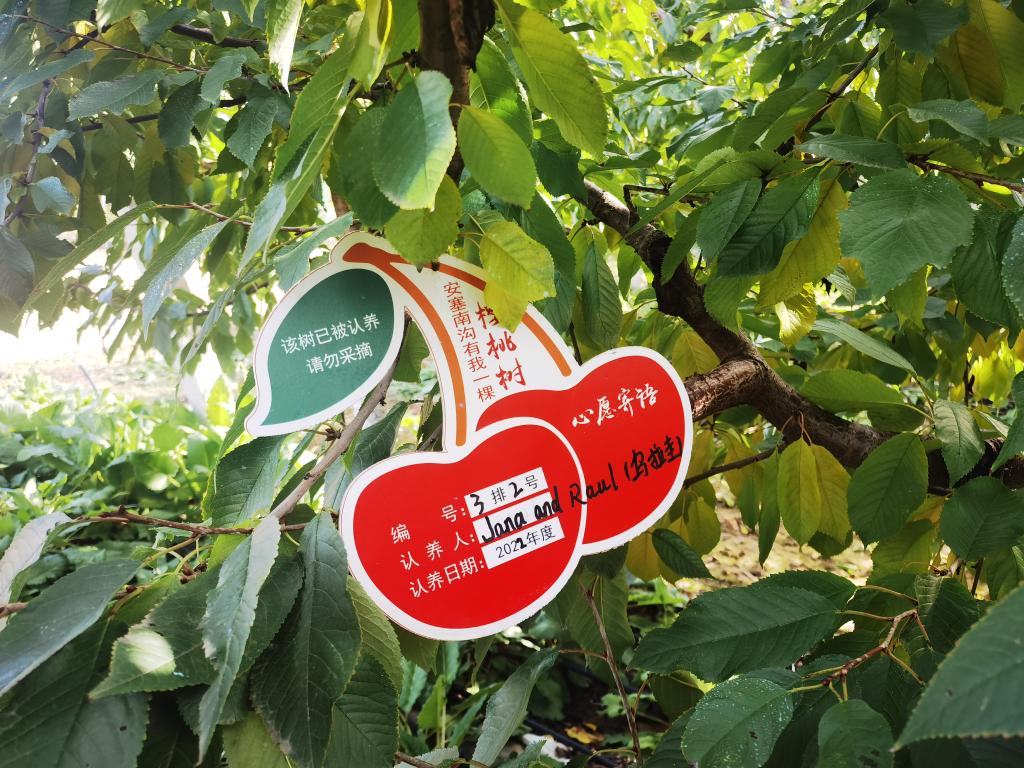Mobile internet fuels agricultural marketing in China’s Loess Plateau-Xinhua
[ad_1]

Photo provided by Zhang Guanghong, a village official in Yan’an, northwest China’s Shaanxi Province, shows an adopted cherry tree and a label with its adopters’ names on it in Nangou Village in Yan’an in Oct. 2021. (Xinhua)
XI’AN, April 15 (Xinhua) — In early April, Zhang Guanghong, a village official in Yan’an, northwest China’s Shaanxi Province, took part in a livestream in a local valley to promote the adoption of cherry trees.
“As you can see, the full blossom promises a bumper harvest. Wherever you are, you can adopt the trees and we will deliver fresh cherries borne by your trees to your home,” Zhang said to online viewers.
Of late, with easier access to mobile internet, more and more farmers in the heartland of China’s Loess Plateau, like Zhang, have begun to sell fruits to customers both at home and overseas using their phones.
Zhang, 41, can still recall how limited the telecommunication was when he first came to the Nangou Village 11 years ago. “At that time, we had to make phone calls at the top of the hill to get a signal,” said Zhang.
Since 2014, the locals started to grow apple and cherry trees in the mountainous area which have been scaled up over the past years. Combined with improved communication infrastructure, Zhang got the idea to feature the beautiful scenery in the village and sell agricultural products via livestreaming.
“These short videos stir up fervor among many netizens beyond the valley. Even customers from Uruguay, Spain and Singapore chose to adopt fruit trees here,” said Zhang, adding that distribution channels for various fruits have also expanded online.
As a result, the annual per capita income of local villagers has risen to 17,500 yuan (about 2738.8 U.S. dollars) last year from some 3,000 yuan in 2011.
A similar scenario can be found in Guan Village, Yanchang County of Yan’an. In a demonstration zone of agricultural adoption service, more than 100 apple trees have been selected by adopters, who can watch live videos in the garden via a mini-program on WeChat.
According to the locals, the combination of adoption services and live streaming sales enables them to earn an extra 1 yuan per kilo of apples.
“Moreover, the authentic scenes in the local cave houses become a unique attraction for customers,” said Wang Gang, who returned to his hometown in Yan’an to develop e-commerce six years ago.
According to Wang, during the peak season from September to the next February, he usually does livestreaming with his fellows, pulling in over 8,000 viewers each time.
“The popularity of mobile internet provides a lower threshold for farmers to apply new technologies in developing their own businesses,” said Wei Yan’an, deputy mayor of Yan’an, also a longtime researcher of rural e-commerce. ■
[ad_2]
Source link






